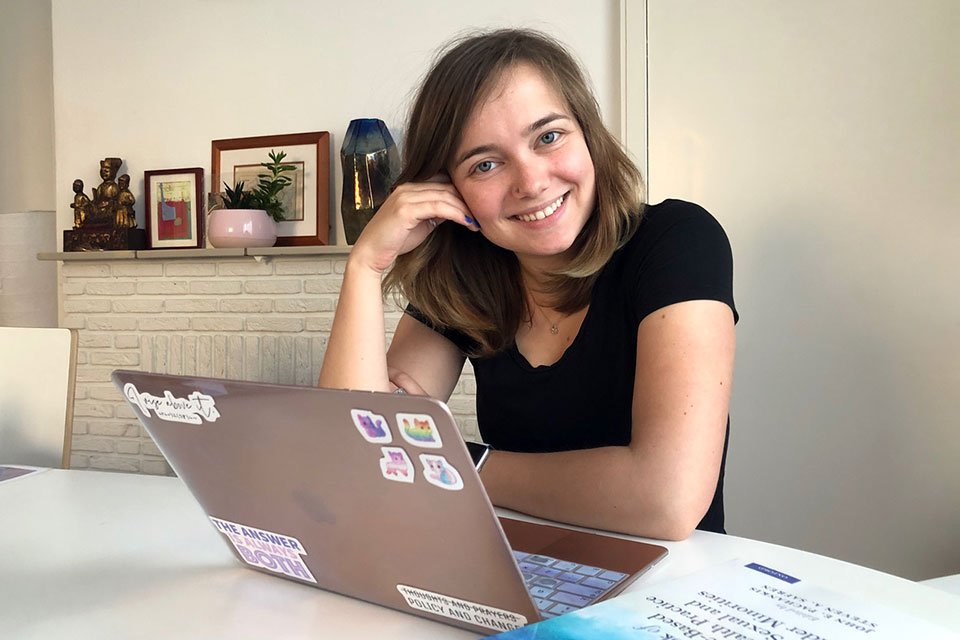Shcherbinina ’16 Offers A Clinical Psychologist’s Insight Into COVID-19
A clinical psychologist practicing in The Hague, Netherlands, Mariya Shcherbinina (Class of ’16) has seen a marked increase in the demand for online therapy sessions since the onset of the COVID-19 Crisis.
“Many people are feeling quite isolated and alienated. Others experience anxiety in
relation to COVID-19 itself, the fear of getting sick or the fear of someone they
love getting sick. Many feel worried for senior members of their families,” said Shcherbinina.
Despite the uncertainty of the times, Shcherbinina assures her patients that there
are strategies they can employ to help them cope.
“We help our clients remind themselves of what they can do in times when they may feel powerless – that by obeying social distancing rules and taking care of their own health, they can also help those who are more vulnerable to the virus,” she explains. “As therapists, we are there to provide a safe space for people to express themselves, help them discover their own strengths, and take stock of their vulnerabilities to help them through social distancing/lockdown. We also teach them skills they may use to regulate their emotions and cope with the current situation in practical terms.”
Shcherbinina also provided some advice to help all of us cope during the pandemic:
Maintain a routine.
Routines exist for a reason: they structure our society and provide a sense of normalcy
even in the most turbulent times. Structure is what gives us purpose and comfort.
Stay connected.
It’s incredibly important to reach out to the people you love, even those you have
not spoken to in a while. We are blessed to be living in the digital age, where the
person you care about is just a Skype call away. The most important thing that anyone
can do for another person is to be there for them, even if it is just online.
Seek help for financial distress.
To those who are experiencing financial distress because of the lockdown: seek help,
consult with experts and look for those in similar situations. There are many programs
in place to help those who have been most affected by the lockdown.
Allow yourself time to grieve.
To those who have lost someone, give yourself time to mourn. Even if you did not have
the time to say goodbye in the hospital, do something special in memory of the person
you lost to commit them to your memory. Tell stories about them with the people who
knew them as well. Ritualize the goodbye – make something with your hands and dedicate
it to them, or write them a letter.
Stay at home.
To those who are sick with the virus, or suspect that you may be, stay at home. The
most important thing right now is your health and the health of those around you.
It’s okay to be frustrated by the lockdown. It’s okay to feel like it’s not fair.
Reach out for help over the internet and create a network of support for yourself
and for others. Together but apart, we will get through this.
About Shcherbinina
Originally from Kyiv, Ukraine, Shcherbinina graduated from SLU-Madrid in 2016 with
a double major in psychology and communication. She went on to earn an M.A. in Psychology
from Webster University Leiden. Subsequently, she co-founded her practice, PSYNT in The Hague and works as a student life counselor at Leiden University. She is currently
working toward a Ph.D. on LGBTQ+ and family psychology at Leiden University, co-hosts
BiPositive, a podcast on the psychological experiences of bisexual and queer people, and runs
TheBadFoodie, a blog surrounding recovery from and life with anorexia nervosa.
She says of her time at SLU-Madrid, “It's here that I realized I had an interest in
psychology and decided to pursue it as a career, here that I learned essential tenets
of communication that I continue to use as a pillar for my work. I am forever grateful
to my professors who were not only deeply passionate about their work, but also showed
me that it was possible – and imperative – to add my own flavor to my studies and
research. The international experience that I had at SLU made me the person I am today:
confident in my endeavor to help people from all over the world, a critical thinker,
and a dedicated mental health provider to my community.”
